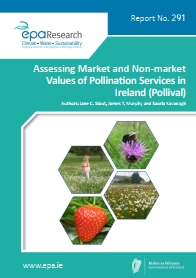Research 291: Assessing market and non-market values of Pollination Services in Ireland
Authors: Jane C. Stout, James T. Murphy and Saorla Kavanagh
Summary: The Pollival project used pollinators and pollination services, which have public and political appeal, as a case study for assessing the market and non-market values of ecosystem services.

Identify Pressures
Pollination has been identified as a key ecosystem service that is threatened globally by anthropogenic activities. Estimation and consideration of the economic benefits of pollination can contribute to land-use decision-making to better support pollinator biodiversity and the sustainability of pollination service delivery. The Pollival project (1) identified best practice to evaluate the current market values of pollination services, (2) estimated the value of pollinators and the implications of pollinator loss on pollination services in Ireland and (3) reviewed and developed methods to assess non-market values of pollinators in Ireland. Using FAOSTAT data on crop production, along with existing data on the degree of reliance of each crop on animal pollination, the Pollival project assessed the economic risks associated with pollinator loss in terms of crop production. However, the total value of pollinators extends beyond food production systems. The full value of pollinators extends to other aspects of economy, cultural and societal benefits, and human health and well-being. Public opinion surveys carried out as part of the Pollival project determined that people in Ireland are aware of pollinator decline and the need to act to reverse this decline.
Inform Policy
By assessing and valuing natural capital assets (using pollinators as an example) and the resultant services (in this case, pollination), nature could be better integrated into decision-making processes. Currently, pollination services are provided for “free” by wild pollinators, with an estimated value of up to nearly €900 million to the Irish economy through production and trade in animal-pollinated crops. Allied to this are the ongoing qualitative, but less quantifiable, societal and health-related benefits. The findings from this research indicate that the majority of people surveyed value pollinators and the services they provide. People surveyed also believe that it is important to conserve pollinators. Nonetheless, the service of pollination is under threat from land-use change, habitat loss, climate change, novel diseases and contamination of vegetation, soils and water with pesticides, among other things. A collaborative approach to ensure continued and future protection of pollinators and maintain the delivery of pollination services is needed to meet Ireland’s national and international policy commitments and obligations, including the Sustainable Development Goals (SDGs). The findings from this research also indicate that that there is a strong economic rationale for further investment in the conservation of wild pollinators. Continued investment would also enhance visibility nationally and internationally and this could enable Ireland to be a “flagship” of “best practice” for conservation and biodiversity. In identifying the need for pollinator protection, the findings from this research entirely align with the All-Ireland Pollinator Plan and can help to inform current and future relevant agri-environment policies and measures.
Develop Solutions
By developing an open-source tool (in R) to estimate the impacts of pollinator decline on global trade balances for animal-pollinated crops, this research identified that pollination services are worth up to €902 million per year in Ireland, in terms of food crop production and trade. This research project developed a framework for holistic evaluation for natural capital and ecosystem services, including non-market and non-use values, and provides solutions and recommendations to facilitate Ireland’s transition to a future that sees the economy, environment and society in harmony.
https://www.epa.ie/media/epa-2020/publications/research/Research_291_thumbnail[1].jpg